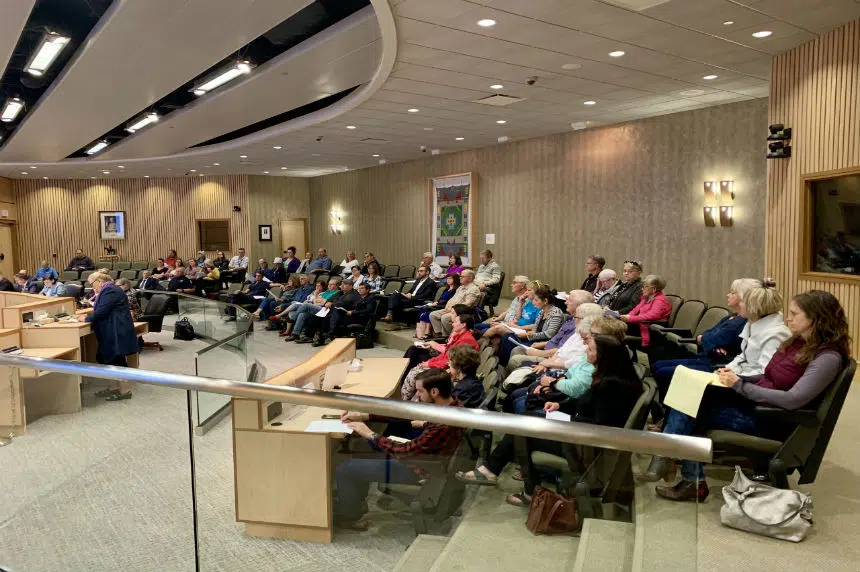Regina city council voted in favour of licensing body rub parlours Monday night, despite a spirited debate against it.
Thirteen delegations spoke before council at a special meeting to discuss the pros and cons of regulating these establishments. All but one delegate wanted to ban body rub parlours.
Ed Smith is one of them. He spoke of how his 17-year-old daughter got caught up in the sex trade in 1990, and how in less than a year she was brutally murdered.
Since then, Smith said it has been his and his wife’s mission to do everything they can to help those exit the sex industry.
“We need to show our women and girls that we will do everything we can to protect them,” Smith told councillors. “If we think that regulations, licensing and bylaws will protect them, we are deceiving ourselves.”
Lidija Spasic also spoke in support of banning body rub parlours. As someone who lives across the street from one on Victoria Avenue, she said she’s fearful for her children.
“I’ve seen (sex workers) — they come outside in their robes to have a cigarette out on their doorstep and they’re not properly dressed; they come out in their robes. My children see that. They look through the window and they wonder why these women are outside in their robes,” Spasic explained to council.
The mother also shared a story of when her daughter was approached by men leaving the establishment and how “without any hesitation they crossed the street and came in front of her to tell her how beautiful she was.”
Council votes six to five to regulate body rub parlours
After hearing horror stories about body rub establishments from delegations, Ward 4 Coun. Lori Bresciani was prompted to form a motion to ban them all together and to instead focus on harm reduction for those working there.
However, the motion was defeated; five councillors — including Mayor Michael Fougere — voted in support of banning body rub parlours, while six voted in favour of licensing them.
Bresciani called the outcome “disappointing.”
“I’ve listened to the residents of Regina and they spoke loud and clear that they wanted a ban in this city. That’s what myself and a few of my council colleagues heard, and that’s our job: To listen to the residents of Regina. And we did try,” she explained.
When asked why he personally chose to ban body rub parlours, Fougere echoed Bresciani’s comments, saying that’s largely what he heard people wanted. But he also noted that “this is democracy” and he does see the benefits of regulation as well.
“With licensing, you can get into the establishment and get a greater connection with both the owner and the workers who are in there, and try to find out what is actually happening. With banning, you may not be able to do that; you don’t have the authority to go in as easy or as quickly,” Fougere said.
Police, sexual assault care worker weigh the benefits of licensing
As city administration crafted their June report on regulating body rub establishments, they sought feedback from the Regina Police Service, which has been in favour of the licensing option.
On Monday night, police chief Evan Bray shared the benefits of regulation in respect to getting a grip on human trafficking in the city.
“It gives (police) the best leverage to understand what’s going on in these establishments and control it through regulation. (Police can) monitor the situation and, of course, link those who are vulnerable in there to supports that they might need,” Bray explained.
“A ban would not eradicate the problem in the city, it would just drive it underground,” he said.
Similar sentiments were shared by Lisa Miller, the executive director of the Regina Sexual Assault Centre.
“Banning the parlours merely makes the problem invisible, and it really does not in any way help the women who are participating or working in them,” she explained to council.
“The work does go underground; they will find other ways. If it’s a trafficking situation, they will find other ways for these women to work or they will move them to a friendlier city where there are regulations in place.”
Miller said the centre supports regulation if the city implements mechanisms to protect the sex workers, such as: Keeping lines of communication open with workers; making criminal record checks mandatory for workers, business owners, funders and managers; and considering ways to support women who are exiting or escaping the trade.
All those suggestions, along with a few others put forward by councillors — like making sure workers are at least 18 years old and legally able to work in Canada, and licensing the workers in addition to the businesses — are expected to be debated early next year.
What’s next?
Fougere said the next step is to have city administration come back by March with the details and regulations related to licensing. There’s also a second component; administration is tasked with coming up with another report on land use issues in regards to where these establishments will be allowed to operate — whether it’s discretionary or permitted use.
Because a bylaw won’t be in place until next year, for the land use or for the licensing, Fougere said all Monday night’s decision does is give body rub parlour owners the heads up that “we’re going to license you now and you can expect to see that happen.”
The earliest the licensing of body rub establishments would come into effect is spring of next year, once the bylaw is passed.











